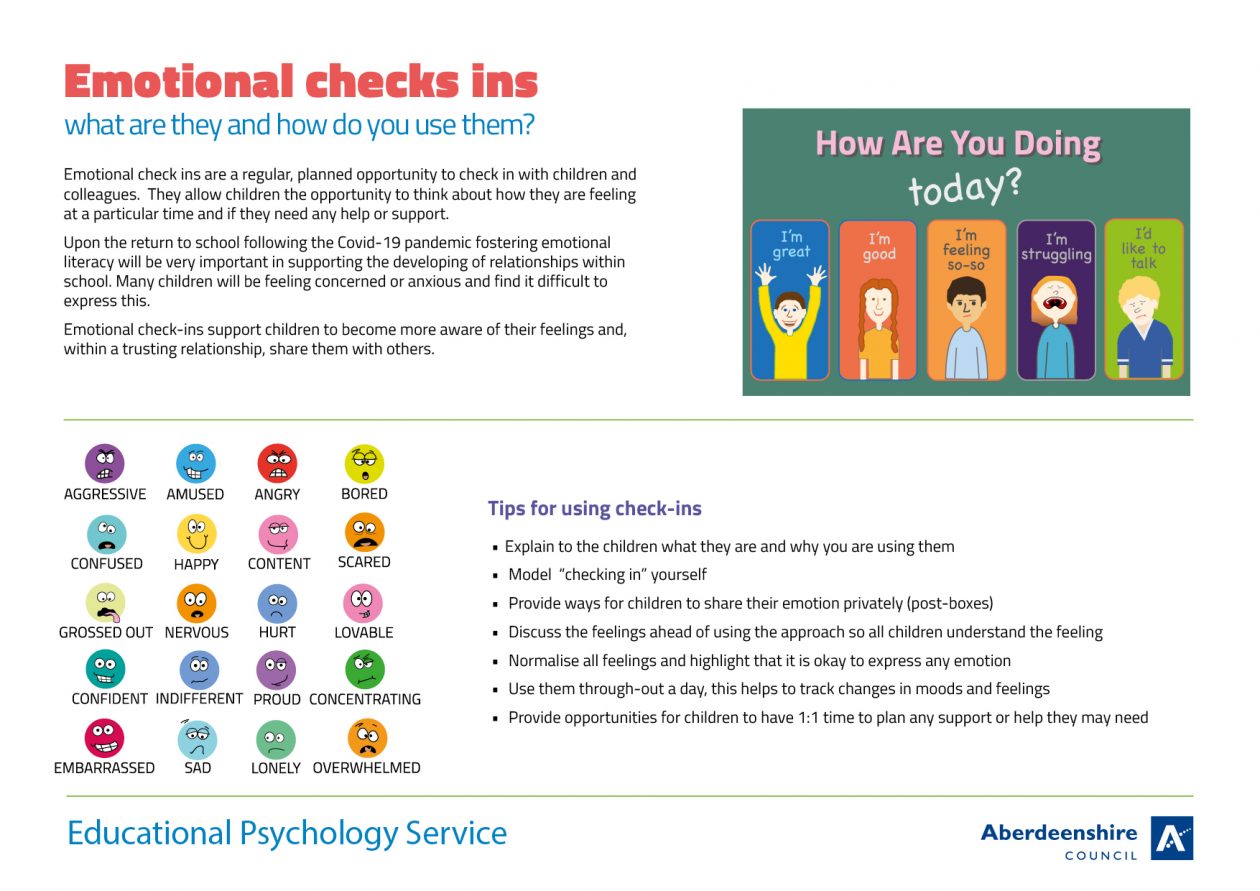
Everyone has feelings, and learning to deal with feelings is a skill that can be supported and taught. Some children and young people may benefit from enhanced support to manage their feelings. Adults can use specific relaxation, breathing and scripted approaches to support self-regulation. It is helpful to check in with children and help them to talk through their feelings. Some children benefit from visual supports to help them name their feelings or concerns.
Self-Regulation
Self-regulation is a skill that children have to develop before they can learn anything. It is a pre-requisite for efficient cognitive development and for good communication and socialization. Self-regulation ability is connected to how we regulate emotion, stress and our physical states.
Click on the following guides for more information:
Introduction to Self regulation
Using scripts to support Self-regulation
Setting boundaries and expectations will help children know how to be successful. Some children may benefit from a visual prompt to reinforce this e.g. a Ok/Not OK board. Click here to access this resource
Understanding feelings
It is helpful to support children and young people to understand emotional wellbeing and feelings. Learning how to deal with feelings is an important skills. The following youtube clip is aimed at younger children and helps them identify and label feelings “characters” associated with a children’s film.
It is important to help children and young people normalise feelings and understand we all experience different feelings and emotions. The following youtube BBC Bitesize resource (aimed at primary children) introduces the concept experiencing different feelings.
The following website has a variety of free resources to support children and young people to think about their feelings Elsasupport.co.uk
It can be helpful to explain to children that emotions are normal and everyone feels differently at different times.
Communication Friendly Environments have a good resource to help explain Anger. Click here to access this resource.
Emotional check-ins
Emotional check-ins are a way to support children to be aware of their feelings and for adults to be aware of changes in emotions.

Click here to access the guide to Emotional Check-Ins
How big a deal is this?
Some children may benefit from tools and resources to help them scale and regulate their feelings. The Five Point Scale is a great resource to help children identify the size of the feeling (view here to access the resource). You can also use the Big Deal/ Little Deal script from the section above. View here to access this script.
Developing resilience
Having resilience or being resilient is important to be able to cope and bounce back from difficult situations. Children and young people can be supported to develop resilience. Education Scotland have shared The Resilience Alphabet (aimed at primary children) which has a range of activities and ideas to help children build resilience.
View The Resilience Alphabet here.
Education Scotland have also shared The Journey (a resource aimed at secondary young people)
Emotion Coaching
Emotion Coaching is a parenting approach which can support children to manage and regulate their feelings. Emotion Coaching UK is a helpful website to explain what this is and how you might use this at home. Click here to access this website.
For an introduction to Emotion Coaching click here
School staff looking for information on Emotion Coaching training please click here
Family Nurture Resources

We have developed a range of family nurture resources on different topics which are relevant to supporting learning at home. These topics include Emotion Coaching, Understanding and Responding to Anger and Self-regulation. Click here to access these resources.
Safe spaces
When we feel overwhelmed we all need a safe place to “retreat” to and have time to regulate ourselves. Often children benefit from an identified “Safe Space”. This is ideally identified with your child- a place they would choose. Children should not be sent there as a sanction and it’s not a reward they have to earn. The space should feel calm and personal to them. They may wish to put cushions or soft toys there. Some children like small spaces- like under beds or stairs. These spaces can be made inviting by using soft lighting and it may be helpful to consider your child’s specific sensory preferences during these calm down times (click here for more information on sensory preferences).
Click on the following website links to access information and ideas about safe spaces.
The National Autism implementation
Relaxation and mindfulness
We all need time out to calm and “breathe”. Click on the following resources to access further information on relaxation and mindfulness resources.
Please view our Wellbeing pages for further ideas and resources.
Parenting support for feelings and self-regulation
Click on the following websites below to access more support:
Parents with Confidence – Calm down strategies
Play for social and emotional development
CAMHS have a variety of resources on different well-being themes

